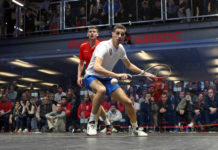By Will Carlin
Nicolas Mueller is the best Swiss squash player ever. This past April, he became Switzerland’s highest-ranked player ever (No. 20 in the world) and, a week later, won his seventh consecutive Swiss National Championship.
In 2013, he had wins over Ong Beng Hee, Marwan Elshorbagy, Tom Richards, and Arturo Salazar. He played Amr Shabana three times, Gregory Gaultier twice and Ramy Ashour once, and was not a quick win for any of them, keeping each on court for at least forty-five minutes. Tall (6’2”), lean and fit, the twenty-four-year-old Mueller was recognized for his good year by being awarded the PSA Young Player of the Year in November.
Mueller also twice did something that happens regularly but is not very usual: he won a match despite winning fewer points than his opponent. In early January of this year, the Atlantic published an article by Ryan Roderberg about this phenomenon in tennis: “[Something called] Simpson’s Paradox is seen in the small percentage of matches where players win more individual points than their opponent, but lose the overall match… Simpson’s Paradox is a statistical quirk where seemingly correlated variables are reversed when combined.”
In their book, Scorecasting, Jon Wertheim and Tobias J. Moskowitz give an example of Simpson’s Paradox described by Ken Ross, a retired professor at the University of Oregon and baseball enthusiast. Ross discovered that in both 1995 and 1996, Derek Jeter had a lower batting average for each season than did David Justice. But when the two years were combined, Jeter had the higher average.
How can this be?
Well, in ’95, Jeter had twelve hits in forty-eight at-bats (a .250 average) while Justice had a .253 average in 411 at-bats. Then the following year, Jeter had a .314 average in 582 at-bats. Justice had only 140 at-bats, but a higher average of .321. That settles the first part.
When you combine the two years for each, however, Jeter’s average was .310 and Justice’s was .270. This happens because Jeter had many more at-bats in his higher average year, while Justice had more at bats in his lower average year. When you combine the two-year totals, Jeter’s average was closer to his better year and Justice’s was closer to his worse.
Roderberg, in his Atlantic article, makes the point that because tennis has a scoring system that has neither a running score nor a clock, “The results can sometimes be peculiar. The only point the winning player must win is the last one.” In tennis, he found, that matches where a loser wins more games than the winner (0-6, 7-5, 7-5) are very rare, but matches where a winner wins fewer points than the loser occur with some regularity. And this allowed him to analyze these matches on a per-player basis.
The person with the highest winning percentage is the biggest server in tennis, John Isner. If you are a fan and know Isner’s game, this makes some sense. For not only does Isner have the best serve, but his return game is almost as correspondingly poor. This means that when he wins a set, it is usually close (he plays by far the highest percentage of tiebreakers in pro tennis), and when he loses a set, it is often far less close (partly because he knows that if he is broken even once, it can be very hard for him to win a set, so he admits to “strategic tanking” of sets in order to win the match).
Fascinatingly, the tennis player with the lowest percentage of winning matches where he has won fewer points than his opponent is none other than Roger Federer.
This result was unlike that for almost every other Grand Slam winner in the study, including Rafael Nadal, Andre Agassi, and Pete Sampras, among others. So, the researchers dug in.
They came up with two explanations:
First, because of Federer’s skill, his opponents may have chosen to play a high risk style of play in order to have a chance for an upset. This could lead to highly variable outcomes, though it would be unlikely that it would be true only for Federer.
Second, they inferred that Federer does not engage in any short-term strategic tanking while playing. Even when he loses, Roderberg wrote, “…the matches are rarely lopsided and almost every individual game is competitive. A nuanced analysis… reveal[s] that [in these matches, Federer] frequently loses his return games after one or more deuces, and drops tightly-contested tiebreakers when the set score reaches 6-6.”
Roderberg concludes that Federer’s poor record in these anomalous matches may, ironically, actually be an empirical point in the argument that he is the greatest player of all time.
In squash, with more straightforward scoring and no dominant shot like the serve in tennis, a winning record in Simpson Paradox matches almost always indicates something positive about the competitor.
Many older and less fit players, for example, are proud to tell you instances where they have strategically tanked a game after being in an early hole in order to perform well later in the match (they usually tell these stories in matches that they have won).
And extremely fit players sometimes are able to blunt the effectiveness of opponents with superior skill through sheer effort; they may get blown out in occasional games, but they are able to stay close enough to pull out the match.
Nicolas Mueller not only won two matches this past year where he won fewer points than his opponent, but he also won two other matches where he and his opponent won the exact same number of points. While he and Federer have opposite records in Simpson Paradox matches, their records may reflect one thing they do have in common: each is the best Swiss player in history.





